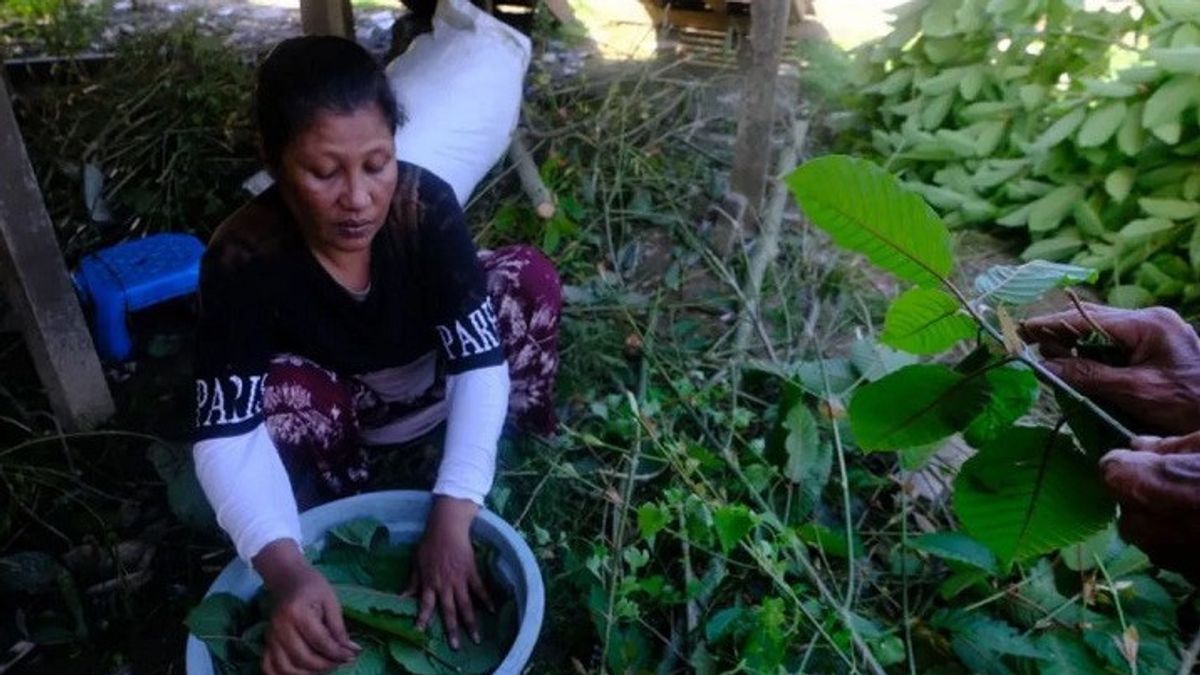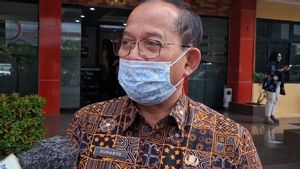JAKARTA The government is still waiting for research by the National Research and Innovation Agency (BRIN) regarding the legality status of the circumstellar plant. This study will later become the basis for establishing policies on the governance and trading system of krotoms.
The Ministry of Health, BRIN and the Food and Drug Supervisory Agency (BPOM) received instructions from President Joko Widodo to examine any content of the circumstellar plant. Until now, the status of the krotom is still colliding between ministries and government agencies.
"The president emphasized that what needs to be optimized is the principle of the benefits of the crotoms," said Presidential Chief of Staff Moeldoko after attending a limited meeting chaired by Jokowi regarding the legalization of the krotoms at the Presidential Palace, Thursday (20/6/2024).
The legality status of the krotom plant is not yet clear, even though there are thousands of farmers who depend on this plant, which is believed to have various properties. On the other hand, the National Narcotics Agency (BNN) insists that the circumstellar plant is dangerous because its addictive substance is higher than marijuana.
In the United States, krotoms are used for opium-dependent therapy, either in the form of powder or pills. But this is a complicated issue in the country, as more than 130 people die from opium overdose every day in 2017, according to the US Department of Health.
Kratom or Mitragyna speciose grew positively in Southeast Asia, including Indonesia. For a long time, people have believed, krotoms have a number of benefits, such as easing stomach pain and linu sores and eliminating fatigue.
People in Kapuas Hulu, West Kalimantan, usually instead use krotom leaves as food for drinks such as tea.
It is this health benefit that makes the krotoms in Kalimantan widely exported to countries of the United States and Europe. It is not surprising that circumatoms are considered promising export commodities in Kalimantan.
Farmers of crotoms had a chance to taste the sweetness of cultivating this Southeast Asian endemic plant, which is one of the leading export commodities from West Kalimantan. How not, in 2019 a krotom farmer was able to pocket Rp600 thousand per day from the sale of krotoms.
In his heyday, the krotom atmosphere was valued at R60,000 to Rp70,000 per kilogram. But now the price has fallen freely to only a fewteen thousand with the same weight.
This price problem has received complaints from all farmers. They believe the price of the circumatoms has slumped due to unhealthy competition. This unhealthy competition is allegedly caused by no government regulation regarding the plant of the crotoms.
On the other hand, according to data from the Ministry of Trade (Kemendag), the export value of krotoms has grown with a trend of 15.92 percent per year, from 2019 to 2022. The largest export destination country is the United States, although in some of its states it prohibits cronatoms.
For this reason, President Jokowi gave an order to relevant ministries and institutions to formulate regulations for the cultivation of crotoms so that their economic value and quality increases. The government also wants to formulate the quality of the krotom for export and socialize it to the public.
If then the legality of the krotom plant has been determined, the hope is that the price of the crotom will improve, and encourage the public to return to farming in krotoms as one of the main sources of income.
However, the economic potential of the krotom contradicts the side effects that have been widely found in importing countries. Cases of addiction and death from krotoms make this plant a dangerous plant.
Therefore, President Jokowi's desire to regulate regulations related to the cultivation of crotoms in Indonesia also still has to wait for the results of research. Currently, the plant is in BRIN research and is accompanied by the Food and Drug Supervisory Agency (BPOM) to further investigate the benefits of using circumatoms. This research is predicted to be completed in August.
Until now, the status of the krotom is still prohibited in Indonesia, in accordance with the Circular Letter of the Head of BPOM no.04.4.42.421.09.16.1740 of 2016 concerning the Prohibition of the Use of the Mitragyna Speciosa (kratom) in traditional medicines and health supplements.
Kratom has active compounds that contribute to therapeutic effects. Some of the main compounds contained include Mitragynine, 7-hydroxymitragynine, Speciociliatine, Coryantheidine, Speciogynine, Paynantheine, and Mitraphylline.
In terms of health, krotoms are believed to have a number of khaisats such as pain relievers, lower blood sugar levels, and make the mood more cheerful.
SEE ALSO:
But some studies say the use of low-dose cronatoms has a stimulant effect, while in high doses it results in depression andwithdrawal (drug break-up symptoms).
BNN itself until now still declares krotom as a narcotic so it is proposed to be a target for prohibition. BNN wants to include cronatoms in the Class I narcotics list, which means it is categorized as very dangerous and prohibited without exception, including for treatment. However, the Krotom leaves have not been included in the Ministry of Health regulations.
It is not without reason that BNN insists on declaring cronatom as illegal. The pretext of BNN, many people abuse the leaves of tanarrubiaceae or the type of coffee.
Meanwhile, the status of crotoms in Indonesia is still in process, in contrast to a number of other countries that have banned this plant, namely Denmark, Poland, Sweden, and Ireland. Malaysia, Myanmar, and Australia also prohibit the substances contained in the krotom for consumption.
If later officially entering Group I of narcotics, both users, dealers, and a network of crotoms will be subject to punishments such as other narcotics. This means that farmers in Kalimantan can no longer plant krotoms, even though the legal demand from other countries is still large.
Krotom researcher Dr. Ari Widiyantoro from FMIPA, Tanjungpura University, is of the opinion that it is not the prohibition required regarding the krotom, but rather the supervision through the official regulations of the Ministry of Health, given the potential of the gratoms related to medical needs. He believes that if consumed in the right dose, the krotom will not cause dependence.
"The only problem is that the use must be regulated, the dosage especially, and who should use it," said Ari.
The English, Chinese, Japanese, Arabic, and French versions are automatically generated by the AI. So there may still be inaccuracies in translating, please always see Indonesian as our main language. (system supported by DigitalSiber.id)













